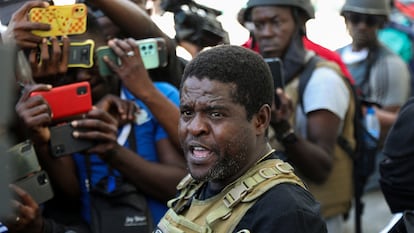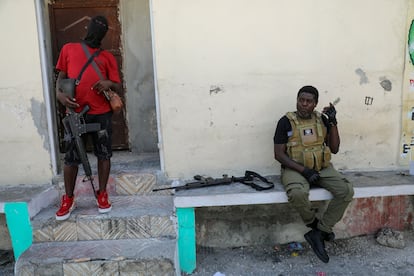Barbecue, the criminal boss of Haiti: ‘If the prime minister does not resign we are heading for a civil war, which will lead to genocide’
Former police officer Jimmy Chérizier, leader of a fluid federation of criminal groups in the capital, Port-au-Prince, has challenged the government amid the prevailing chaos

Haiti is descending into chaos. It is a surprisingly long road, which the country is taking step by step, sometimes slowly, sometimes at a faster pace. The past week has been one of the more accelerated ones. In the space of a few days, Haitians have witnessed the escape of more than 3,000 prisoners from various jails, attacks on the airport of the capital, Port-au-Prince, as well as gun battles between the military, police, and gangsters. Among all this, the eye-catching press conferences held by one of the most media-friendly criminal leaders of recent years: Jimmy Chérizier, alias Barbecue, now an aspiring guerrilla commander.
On Tuesday, Chérizier attended to the press in Delmas 6, a neighborhood not far from downtown Port-au-Prince. He did so as if he were an activist for change, master of a markedly political discourse. Over his clothes, however, he wore a bulletproof vest and, slung over his shoulder, he carried an AK-47-type rifle with a double magazine. Next to him, as advisors, two boys with their faces covered were carrying machine guns. All this took place with Port-au-Prince turned upside down due to the running battles of recent days, half-pending the state of emergency decreed by the government.
It was one of the images of the week in Haiti: while the prime minister and acting head of government, Ariel Henry, was looking for a way to return to the country after a trip overseas, Barbecue — accused of carrying out massacres in the capital in recent years — played the role of the opposition. He criticized Henry, as he has done many times over the years: “If Henry does not resign, if the international community continues to support him, we are heading for a civil war, which will lead to genocide.”

Not that Chérizier’s statements came as a surprise. Within the complex universe of criminal groups that hold sway over more than half of the capital, according to the United Nations, the federation he heads, G-9 Family and Friends, is one of the most powerful. Its voice has appeared with some assiduity in the media over the years, in interviews and impromptu press conferences in the neighborhoods it dominates, near downtown and the port terminal. More surprising, however, is the tone of the threats directed at Henry after the chaos of the previous week, with prison break-outs and battles in the streets.
The situation is gradually worsening in the Caribbean country. All its crises are becoming entangled. About 1,200 people have been killed since the beginning of the year, according to the U.N. Henry’s own situation shows how precarious it all is. Last week, the prime minister, who has been in power since the assassination of President Jovenel Moïse in July 2021, traveled to Nairobi, to try to give a final push to a cooperation agreement with the Kenyan government that would involve sending 1,000 policemen to Haiti, with the financial support of the United States and Canada. The agreement seemed to finally be close to fruition.
But then the latest battle for Port-au-Prince began. It is not clear which of the dozens of gangs that roam freely in the capital participated in the assault on the prisons, or whether Chérizier himself led the attack. What is certain that he later claimed responsibility, again occupying the role of guerrilla leader. Barbecue had no qualms in saying that his intention was to capture the head of the Haitian police, Frantz Elbe, with the ultimate goal of overthrowing Henry’s government.
Henry made his way back, but his return trip was equally chaotic. The prime minister boarded a plane in Nairobi, bound for Port-au-Prince, but landed in Puerto Rico instead. The riots at the capital’s airport made his landing impossible. It was curious that Henry did not divert to the Dominican Republic, Haiti’s neighbor, but on Wednesday, the Dominican government said that it could not allow the prime minister’s plane to make an indefinite stopover in the country. The response fueled the long history of friction between the two nations, always with the border at the center of the dispute.
The instability makes it difficult to foresee the development of events in the medium term, or even in the short term. The Miami Herald reported the U.S. government and Caricom, the organization of Caribbean States, are trying to force Henry out of government in an attempt to channel the discontent of sections of Haitian society. The calling of elections and the arrival of a mission to support the country’s security forces have been put forward as the main points of any path to future stability.
Sign up for our weekly newsletter to get more English-language news coverage from EL PAÍS USA Edition
Tu suscripción se está usando en otro dispositivo
¿Quieres añadir otro usuario a tu suscripción?
Si continúas leyendo en este dispositivo, no se podrá leer en el otro.
FlechaTu suscripción se está usando en otro dispositivo y solo puedes acceder a EL PAÍS desde un dispositivo a la vez.
Si quieres compartir tu cuenta, cambia tu suscripción a la modalidad Premium, así podrás añadir otro usuario. Cada uno accederá con su propia cuenta de email, lo que os permitirá personalizar vuestra experiencia en EL PAÍS.
¿Tienes una suscripción de empresa? Accede aquí para contratar más cuentas.
En el caso de no saber quién está usando tu cuenta, te recomendamos cambiar tu contraseña aquí.
Si decides continuar compartiendo tu cuenta, este mensaje se mostrará en tu dispositivo y en el de la otra persona que está usando tu cuenta de forma indefinida, afectando a tu experiencia de lectura. Puedes consultar aquí los términos y condiciones de la suscripción digital.









































